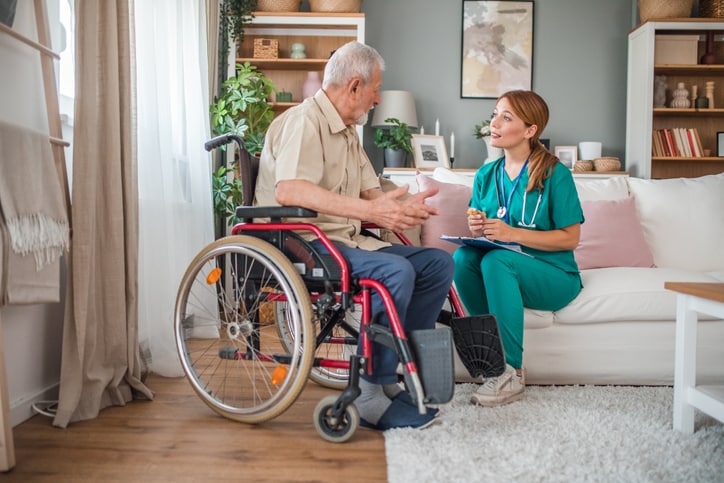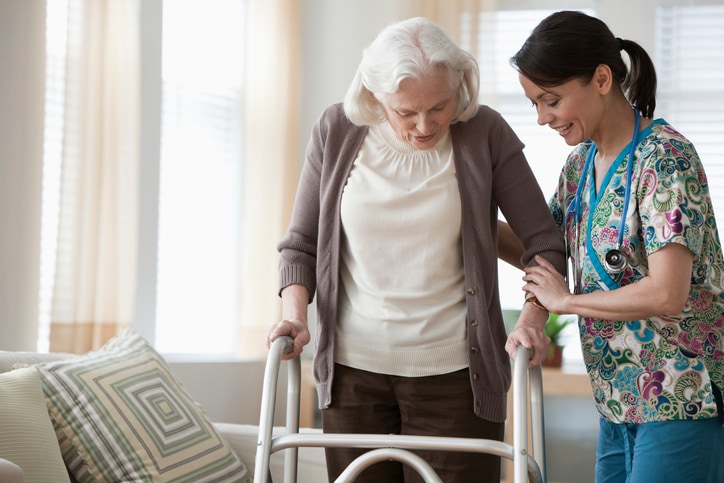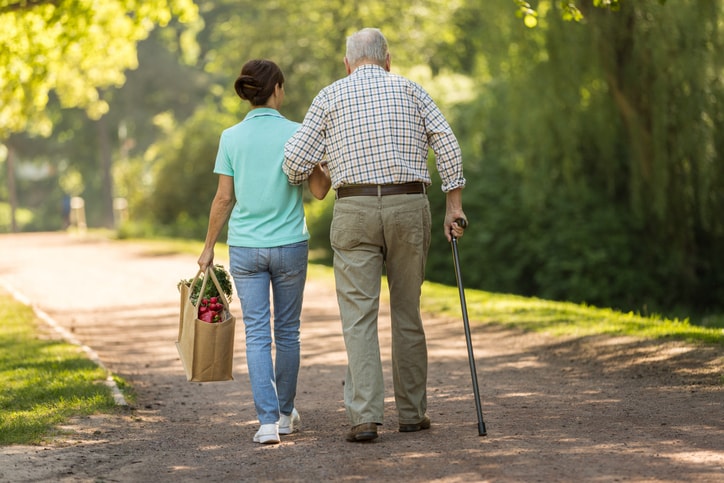From learning a new language to joining a gardening club, classes for seniors can run the gamut of individual interests. Perhaps you are hoping to take a regular fitness class to improve your health or you are looking for community-oriented offerings to help your aging loved one make new connections. With so many options, you might wonder where to even start.
But there is so much value in seeking these classes out, in whatever capacity you can. “As we age, our social circles often become smaller,” says Sondra “Sam” Cradduck, gerontologist, psychologist and owner of The Living Room. This is largely due to largely unavoidable life events — like retirement, your children growing up and losing peers to death, moves and their own life changes, she adds.
Participating in classes can help foster new connections, in addition to improving your mental and physical health, according to the experts we spoke to. Here, they will share what kinds of classes are available, their benefits and how to find the right class for you.
Physical fitness classes
There are a multitude of benefits for older adults to gain from taking fitness classes, such as “improving muscle strength and endurance, which can help with balance and [reduce] the risk for falls,” says Michelle A. McKay, a registered nurse specializing in geriatrics and assistant professor at M. Louise Fitzpatrick College of Nursing at Villanova University.
However, Joy Loverde, a mature-market consultant and best-selling author of the “Who Will Take Care Of Me When I’m Old?” and “The Complete Eldercare Planner” cautions that “older students who are contemplating signing up for classes that are physical in nature, like yoga and ballet, are wise to consult their doctor ahead of time.”
In-person senior fitness classes
Starting with gentle movement and mobility classes and moving on to more strenuous classes, the experts we spoke to shared common offerings for older adults:
- Chair yoga: These are great workouts that have the benefit of being low-impact, says Cradduck.
- Tai Chi, which is ideal for building strength and improving balance, is one of the offerings at Thompson Park Activity Center, says Brenda Myran, the community education program coordinator for adults 55+ in West St. Paul, Minnesota.
- Water aerobics is another low-impact exercise the experts recommend.
- Martial arts. Kylie Meyer, assistant professor at the Frances Payne Bolton School of Nursing at Case Western Reserve University shares that her mother began a martial arts class she found through her community recreation newsletter when she was 55. “Now, at age 64, she also instructs students and will complete her third-degree black belt test in February,” she says. “She’s not only found an activity she enjoys but a wonderful community.”
Online senior fitness classes
- Vivo: This company provides virtual classes that focus specifically on “strength, balance and mobility,” says Nicole Will, founder of willGather podcast and cofounder of Think Tank. Additionally, they address “the emotional and mental barriers to exercise, such as fear,” she adds. “They create a safe environment for older adults to feel empowered.”
- Chair One Fitness: Specializing in seated exercise classes, Will recommends them for “movement at every level.”
- SilverSneakers: Available at no cost for adults 65+ through select Medicare plans, SilverSneakers offers both online and in-person classes.
Cognitive and educational classes
To keep your brain sharp and continue a lifelong journey of learning, here are some classes that experts suggest and may be available at a senior center, library, nature center or other cultural institution near you.
Creative and cognitive activities
- Mahjong.
- Bridge.
- Birdwatching.
- Watercolor.
- Knitting.
- Wood carving.
Educational opportunities
- Foreign languages.
- Current or historical politics.
- Aging topics, such as Medicare and writing a will.
- Driver’s safety.
- Tech assistance.
- Cooking and nutrition.
Online educational classes:
- The Smarter Service: This tech concierge company for older adults “empowers people to navigate a digital world,” says Will. They work with larger organizations, such as senior living communities, to educate seniors on how to engage with technology in a safe way.
- Get Set Up: This platform has a wide variety of offerings for seniors to explore new hobbies, learn skills for potential work opportunities or familiarize themselves with technology, all with a peer-to-peer teaching model.
- Oasis Everywhere: These virtual classes for older adults cover everything from technology to music.
Social and community-oriented classes
While all of the previously mentioned classes have a social aspect, these classes allow for more individual interaction. Your local community or senior center may have some offerings, but you can also inquire at your local library, place of worship or cultural institutions (such as museums, nature centers and theaters).
Dance and music classes
- Dance classes, such as salsa, tango or square dancing. Meyer adds that some dance classes may offer a “‘chair version of dances for people living with a physical disability.”
- Music lessons: Maybe it’s your first time playing an instrument, or perhaps you’re reacquainting yourself with an old friend.
- A local choir or singing group: While not technically a class, participating in a group activity like this has similar social benefits.
Volunteer and service-oriented activities
- Community gardening.
- A local park or beach cleanup.
- Becoming a reading assistant at your local elementary school.
Clubs and discussion groups
- Day trips to local sites.
- Book clubs.
- Movie clubs.
- Gardening clubs.
Online social and community classes
- Road Scholar: In addition to mapping out travel adventures (including cost, key stops and more) by activity level, Road Scholar also has virtual options that allow everyone to experience the world.
The benefits of classes for seniors
So why prioritize participating in classes in your community? The National Institute on Aging shares that there are measurable benefits, both physically and mentally.
“The positive impacts are immense. Social interaction, mental stimulation and physical activity are great benefits to people’s health, mood and happiness,” adds Myran.
The physical
As you age, you experience “loss of bone density, muscle tone and flexibility,” says McKay. “Strength and flexibility classes are helpful for improving muscle strength, joint movement and balance. Improved strength and flexibility can make it easier to complete activities of daily living independently and reduce the risk for falls.”
“Exercise can lower the risk of cardiovascular disease and improve joint pain and mobility,” she adds.
The mental
“About one-third of older adults report feelings of loneliness, which is associated with both anxiety and depression,” says Meyer. “While all age groups may experience loneliness, factors that occur more often in late life, such as retiring from a job, losing a spouse or other loved ones and barriers to attending social events (such as physical disabilities), can put older adults at a greater risk.”
Though taking a class cannot replace or negate those experiences, they are “helpful for preventing social isolation, improving depressive symptoms and decreasing loneliness,” adds McKay. “There are even some studies that show exercise can help with cognitive function like improved memory.”
Tips for finding the right class for you
When it comes to finding the right class for you or your loved one, there are a number of things to consider: What your fitness level is, your interests, what you hope to gain and any potential barriers to you taking classes, such as financial or transportation issues. If you do have concerns about you or your loved one attending a class, the experts shared ideas here for navigating those challenges.
- Physical capabilities: If you’re concerned about you or your loved one’s ability to participate in a class, McKay suggests speaking to instructors ahead of time about your goals and current physical abilities. “Most instructors will offer modifications or different exercises if needed based on skill level,” she says.
- Financial limitations: With many older adults living on a fixed income, finances could make classes inaccessible. However, Meyer notes that “many senior center and online programs are offered free of charge or at reduced rates. Older adults can also ask about ‘scholarships’ to help them attend,” as well, she says.
- Limited classes: In addition to accessing online classes, McKay suggests contacting your local government officials or community organizers if senior-based exercise classes aren’t available in your area and asking them if there is an opportunity to start one. “Many local, state and government organizations offer training for instructors for evidence-based exercise programs geared to older adults,” she says.
- Lack of transportation: If getting to classes is a problem, one option is to have older adults and their families work together to set up a schedule where someone drives them. If that’s not an option, Cradduck adds that your community may have programs that offer transportation or reimbursement vouchers.
Where to find classes
Now that you have a small sense of what kinds of classes and activities may be available to you and/or your loved one, you might be wondering where to start looking. In addition to the standard community center offerings, you might also find classes (senior-specific or not) at the following locations:
- Libraries.
- Schools.
- YMCA.
- Online.
If you’re unsure of where to find classes in your area, Meyer suggests utilizing Area Agencies on Aging.
A final word on classes for seniors
According to the National Institute on Aging, older adults may find themselves spending more time at home alone as they age. This social isolation can lead to an increase in feelings of depression and anxiety, as well as other health issues.
And while classes for seniors can’t fix all of your problems, “physically getting out of the house and putting oneself in the presence of like-minded people offers many benefits,” says Loverde. “Beyond learning something new, classes foster a strong sense of community, allowing older adults to connect and engage with individuals of all ages,” she adds.
And with so many different types of classes available (from chair yoga to learning mahjong), you’re bound to find something that resonates and is accessible for you or your older loved one.
After all, these classes have the potential to improve “our health and our overall well-being,” through “learning new skills, engaging in education, keeping our mind sharp, feeling that we have a sense of purpose and that we’re utilizing the gifts and the talents that we have,” concludes Will.







